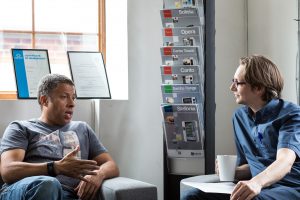This time, Inamori* spoke about the above motto in Kyocera philosophy.
What Inamori said is quoted with “”.
“ That guy, well-educated with under graduate background, was sitting quietly at the washing station, working silently and methodically.
‘He’s so quiet, and doesn’t seem to have much presence,’ I thought. ‘He is doing something like that could be rinsed off quickly in no time. He’s so inefficient.’
That’s what I was thinking as I watched my senior colleague work.
However, while I was washing things carelessly, I just couldn’t get good results in my experiments.
It felt like I had been struck on the head.
By washing carelessly, I had failed to remove all the powder left over from previous tests. That tiny amount of residue contaminated the new material and completely changed the properties of the ceramics.
‘Come to think of it, that senior colleague used a spatula-like tool to carefully remove the leftover powder stuck in each groove of the mixing bowls. He even dried each bowl with a towel hanging from his waist. So that’s the level of precision it takes to get the results you want…’ “
This passage is something I’ve read many times in the Kyocera Philosophy.
But this time, I began to wonder—was that quiet man actually Inamori-san himself?
Rather than directing his words at someone else, maybe he was speaking to his younger self: a fresh university graduate, someone smart but out of touch with the field, someone who ignored the little details because he relied too much on intellect.
I believe Inamori was trying to teach the importance of firsthand experience to young researchers like that—those who hadn’t yet grasped the value of on-site work.

To a prideful new graduate, simply telling them, ‘Go work in the field,’ would likely fall on deaf ears.
They might scoff, thinking, ‘Why should someone with a university degree work alongside juniors or high school dropouts?’
But by sharing a story like this, Inamori-san offered a lesson without confrontation.
It invites the listener to reflect: ‘Ah, so this is the difference between me and my senior.’
They may begin to listen with humility.

Kyocera Philosophy is filled with stories like this—insights designed to help bright but prideful young staff learn how to listen with an open heart.
Now, as for the field-first mindset in our own work—our company is engaged in real estate brokerage and appraisal.
In our profession, there are three main pillars to practicing respect for the field:
1. Actually using the property—experiencing it firsthand.
2. Collecting data by walking the ground yourself.
3. Understanding the culture and values of other countries.
Let us explore each of these ideas in more depth.
1. Actually using the property—experiencing it firsthand
” The overseas plant manager insisted there was no need for him to go to the shop floor.
So I told him, ‘Go see it for yourself. You’ll realize that the data you’re looking at is completely bogus.’
That, of course, led to yet another argument. ”
→ Western society, broadly speaking, is a class-based society. There is a deep-seated mindset: slaves do the work of slaves while those in positions of power take it easy—and that it is only natural for the ruling class to live this way. When such assumptions take root, people unconsciously create classes. They come up with excuses and justifications to avoid the labor they themselves ought to be doing.
But when you avoid the work, you lose sight of the truth. And once you lose sight of the truth, management begins to fail. The Western-style approach is: before profits collapse, quickly sell off the company. Mr. Inamori’s message was the opposite: before management reaches a crisis, “The role of management is to identify precisely where the bleeding is happening—and to stop it.”

2. Collecting data by walking the ground yourself.
“ What are you talking about? I’ve always made it a point to prioritize the field. No matter what anyone says, I will go out there myself! ”
→ These are the words of Mr. Inamori, who remained steadfast in his commitment to on-site engagement.
Real estate is an immovable asset—so you have no choice but to move yourself.
Only by physically visiting a property, breathing in the air around it, and experiencing how it is used, can you truly understand its value.
You often see advertisements saying, “Take this seminar and you’ll master real estate investment easily!”
But no amount of classroom learning alone will make you truly understand real estate.
Unless you go out to the field and visit numerous properties, you won’t grasp the unique features, differences, or hidden risks that each one carries.
As Mr. Inamori emphasized, in any business, understanding the field is absolutely essential.

3. Understanding the culture and values of other countries.
” ‘You keep coming down to the factory floor and working alongside the workers,” said the American plant manager. ’But frankly, this creates a problem for us. You’re the top executive of our Japanese parent company, and more than that, an owner-founder. To see someone like you dressed in work clothes, helping out with manual tasks on the floor—it’s simply unthinkable.
As the top leader, you must have far more important responsibilities. Yet, when people see you doing the same work as someone earning $3 or $5 an hour, they will only think one of two things: either that this is the only kind of work you’re capable of, or that you’re just goofing off.
If you want to understand what’s happening on the floor, please just let us know. We’ll bring someone to your office to explain it. But we’d really prefer that you stay out of the field.‘
I was stunned by those words. ”
→ Perhaps it’s a form of bias on my part, but I’ve come to feel that, outside of Japan, the belief that “money is everything” has deeply taken root in many societies.
There’s also a misguided notion that “labor is not a virtue, but a punishment for those not chosen by God.”
Against such a cultural backdrop, we can begin to understand why episodes like the one above occurred when Mr. Inamori visited a U.S. subsidiary.
It is precisely because he had first-hand knowledge of the field that he was able to recognize these cultural gaps.

People often assume that working in real estate means you only need to understand the domestic market.
But more and more, foreign investors are entering the Japanese market—and even using the properties located in Japan in many ways.
That’s why it’s so important to understand, through real-world experience, the values and perspectives of people from other countries.
And this isn’t just about real estate. It applies to all types of work.
What foreigners truly value, how they make decisions—these things are rarely conveyed accurately by Japanese media.
There are many truths and realities that we simply cannot grasp unless we look beyond our own borders.
That’s why I believe we must proactively step outside Japan and expose ourselves to the world. It is through these experiences that the invisible becomes visible.

To summarize, I believe the essence of a field-first mindset consists of:
1. Learning through direct, personal experience.
2. Collecting information and data by walking the ground yourself.
3. Gaining first-hand understanding of not only Japanese but also foreign values and perspectives.
These, I believe, are the core principles of respecting the field.
* Mr. Kazuo Inamori, the founder of Kyocera, KDDI (one of the top tele communication companies in Japan) and the top of revitalization project of JAL. As a well-known Japanese entrepreneur, he has been sharing his experiences and management know-how with managements of small to middle companies in Japan.
Further queries or doubts, please email to ytomizuka@abrilsjp.com
News Letter subscription is here











